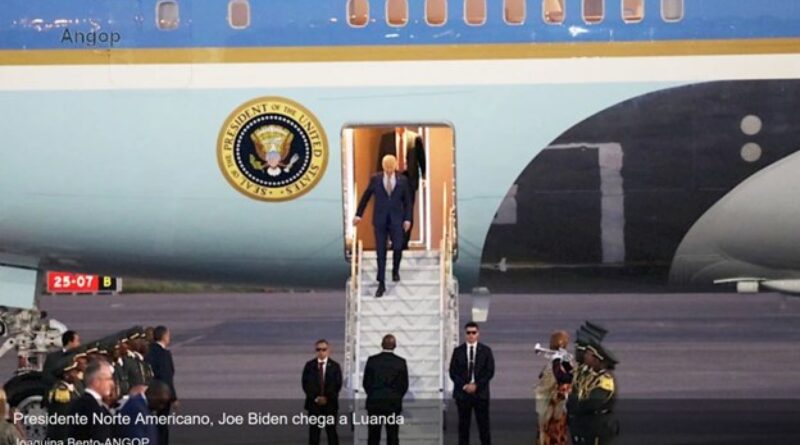Angola: President Joe Biden Arrives in Angola
Luanda — The President of the United States, Joe Biden, arrived in Luanda on Monday afternoon for a three-day state visit, focused on consolidating the strategic partnership.
The official ‘Air Force One’ plane, the mythical blue and white 747 that carries the US President, landed at 5:30 pm at February 4 International Airport.
Joe Biden, who is in Angola at the invitation of his counterpart João Lourenço, was received at the Presidential Complex of the 04 de Fevereiro International Airport by the Angolan Minister of Foreign Affairs, Téte António.
The reception committee included the Chargé d’Affaires and Acting Ambassador of the United States to Angola, James Story, the Angolan Ambassador to the United States, Agostinho Van-Dúnem, among other personalities from the Angolan Government and the American administration.
The visit of the US President recognizes Angola’s role as a regional leader and will reaffirm the true transformation of the relationship between both states.
The two countries work together to address pressing and critical challenges, such as improving infrastructure in Africa and enhancing economic opportunities and sustainable development on the continent.
The expansion of technologies and scientific cooperation, the strengthening of peace and security, and the strengthening of food security are also other priorities defined by the parties in their strategic relationship.
With this visit, they will have the opportunity to assess the effectiveness of existing agreements and to project new areas of investment, involving the private sector in particular.
During the three-day visit, the highlight will be a meeting with the Angolan Head of State, João Lourenço, on Tuesday, to address the future strategy of bilateral cooperation relations.
On the same day, Biden is going to visit the Museum of Slavery, where he will deliver a speech to highlight the enduring strength and relevance of U.S. relations with Angola and Africa, overall, in addressing a wide range of global challenges.
Located in Morro da Cruz, in the city of Luanda, the National Museum of Slavery is an important cultural heritage of Angola that is dedicated to the preservation of the collective memory of the 500 years of slavery to which Angolans were subjected.
Inaugurated in 1997, this important information system is filled with artifacts of high historical value that preserve and report the long history of slavery in Angolan territory.
On Wednesday, Joe Biden will travel to the province of Benguela, where he will learn about the Grupo Cart factory, as well as visit the Port of Lobito, an important infrastructure of the Lobito Corridor.
Founded on March 24, 1928, the Porto is one of the largest seaport compounds in the country.
The Port is the head of the Benguela Railway, which brings cargo from the city of Tenque, in the Democratic Republic of Congo.
President Joe Biden’s agenda in Benguela also includes participation in the Angola/US Business Forum.
The US President leaves the country on Wednesday, from Catumbela airport, in Benguela province.
Bilateral Relations
Angola and the US are strategic partners, with political-diplomatic and cooperation relations that have increased significantly for 30 years, leading to the signing of several legal instruments in the social, commercial and business fields.
The rapprochement with the Americans has made Angola the third largest creditor of the US with a debt that has grown by 223 percent in the last seven years.
The arrival of João Lourenço to the Government in 2017 led to a redefinition of the country’s priorities in terms of relations with the main world powers, with a more open approach to the United States of America (USA).

Sign up for free AllAfrica Newsletters
Get the latest in African news delivered straight to your inbox
Therefore, Joe Biden’s visit is a new window for attracting new American investors, who can take advantage of the improved business environment in Angola to diversify their investments.
It is hoped that with this State mission, the two countries will find platforms of understanding adjusted to the reality of their respective peoples, capable of providing mutual advantages and diversifying existing cooperation.
Currently, the cooperation relations between the two countries have their legal framework based on a General Agreement that operates in the most varied areas of the country’s economic and social life, with a strong presence in the areas of infrastructure, trade, industry, agriculture, health, media, transport, food security, among others. DC/ART/DOJ

